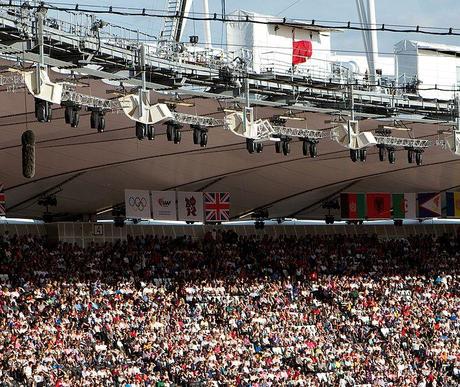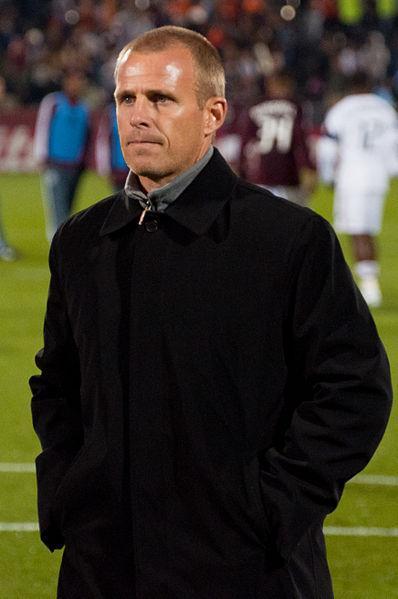Skies Aren’t Blue at Coventry
A complicated subject to start things off.
As covered previously, following the long-running refusal of Coventry City to pay the rent of the stadium they play their home games in, ACL, the company who look after the Ricoh Arena for co-owners Coventry City Council and the Alan Edward Higgs Trust, applied to put the club into administration.
Relatively clear so far.
But the rent for the stadium is paid (or at least was, once upon a time) through Coventry City Football Club Ltd. The remaining assets of the club – including player registrations and the ‘golden share’, which gives a club Football League membership – are owned by Coventry City Football Club Holdings Ltd. SISU, the trust fund who own the club, argue that this means only Limited have gone into administration, meaning Holdings Ltd should be allowed to carry on as normal and that the club shouldn’t be deducted 10 points.
It’s not unusual for football clubs to try and get around rules intended to ensure fair play on a technicality. Looking back historically, it was illegal for football clubs to be traded on the Stock Exchange to prevent clubs being used for financial speculation. In 1983, Irving Scholar’s Tottenham got around this by creating a new company whose only asset was the football club, and then putting this company on the Stock Exchange instead.
More closely linked to Coventry’s example, in 2009 Southampton claimed that as the parent company and not the club themselves had been placed into administration, the club shouldn’t have been deducted points. It’s natural that with the points deduction being a season-altering punishment, the lawyers would be called in to argue over technicalities in cases when the broad principle has clearly been broken, but it doesn’t take away the nasty taste.
The general consensus seems to be that Coventry are being overcharged for their rent even if their argument that they’re being charged far more than the average is slightly false logic. In a division where clubs the size of Walsall, Hartlepool, Scunthorpe and Oldham are more the norm than Sheffield United and Coventry, the Sky Blues should be paying an above average rent.
Since the case went to the High Court, Coventry City Football Club appear to have fully withdrawn from the Ricoh Arena, with the club shop now entirely emptied of stock. However, they have reached an argeement to play the remainder of their home games at the stadium for the remainder of the stadium.

Possibly two of the trucks used. But probably not. Courtesy of Ildar Sagdejev
As if all that wasn’t bad enough, it’s emerged that aside from the £1.3 million owed in rent, Coventry are £61 million pounds in total debt. For a comparison, the most recent figure on Portsmouth I can find from a reputable source says that as of last April, they owed £58 million.
According to the Coventry Telegraph:
Some £8.4 million of that is owed to Cayman Island hedge fund Arvo. The bulk of the rest is believed to be owed to funds related to Sky Blues owners SISU.
The relationship with Arvo appears to be borrowing, secured against assets including grass mowers and gym equipment, but the nature of the rest of the debt appears unclear. I may well be owner investment that’s technically a loan (similar to the money owed to Roman Abramovich and Steve Gibson), but the situation looks suspicious.
Finally, the football consequences – without the points deduction, Coventry are 10th, five points below the play-offs, with a possible six-pointer against Walsall on Easter Monday. With it, they’ll still be 12 points above the relegation zone but would be almost mathematically incapable of reaching a play-off place.
Given that in Southampton’s case, forensic accountancy needed to be done to determine that the two companies were operating as one, a decision may not be immediate.
Leyton Orient’s Olympic Hurdle
Most weeks, the big story regarding stadium moves in League One would have been Leyton Orient’s. With the Olympic Stadium awarded to West Ham, Orient chairman Barry Hearn has again said this could be a fatal blow to his club.
Cheaper prices, more family friendly offers and better atmospheres (rather than a half-engaged upper middle class crowd) are generally among the big attractions lower league teams have over their bigger rivals. But if West Ham are to move into the Olympic Stadium, they’ll have a capacity larger than their current fanbase, meaning it’ll make sense to lower at least some prices drastically. With the grounds less than four miles apart, it’s likely Leyton Orient would be the losers.
Having said that, Hearn’s ideas of ‘solutions’ to the problem don’t make it easy to empathise with him. Earlier in the season, he spoke about renaming the club London Orient to represent all of the capital, and this week he’s discussed moving the club to Essex. But there are two very fundamental problems with that idea – it would massively inconvenience the community Hearn claims to care most about and threatens to draw supporters away from a historic non-league club in the same way he fears West Ham will draw fans away from Orient.
Would it be any more moral to relocate the club than Wimbledon’s relocation to Milton Keynes? Hearn and those who support his position will argue that the survival of the club is at stake, but those proposing MK Dons’ relocation made the same arguments.
On a related note, Barnet’s move away from Underhill to The Hive, outside the borough of Barnet, has met with some opposition from their fans. Despite it being outside their natural home, I hadn’t considered this possibility until I read about the objections – it struck me as no different to a team in a one-club city moving to the outskirts as Coventry, Middlesbrough and many, many others have done in recent years. Like most fans, I’d argue that MK Dons’ 50 mile relocation was a black and white, morally wrong idea. But the relocations of West Ham, Leyton Orient and Barnet are a bit more complex.

Not the home of Leyton Orient. Courtesy of Thomas Brasington
Just Another Financial Struggle
Good news of sorts at Wycombe – a hearing concerning overdue taxes has been adjourned until May.
Unlike Coventry and Portsmouth, it appears to be an issue of cash-flow, and as far as I can tell there isn’t any large scale mismanagement below the surface.
Wycombe’s struggles simply indicate that while the rich are getting richer, more and more teams in the lower leagues are, through little fault of their own, struggling with the basics.
Please Don’t Sing
I’ll continue with the sense of negativity as I seek to spread the feeling that everyone with any authority in football is trying to make the experience of watching the game worse. The Football League Trophy final is coming up soon, and the singers for the national anthem have been announced…
Helen Chamberlain and Max Rushden.
Yes, the hosts of Soccer AM.
Chamberlain hasn’t quite inspired confidence, saying
“I don’t think I’ve ever sung in public anywhere, but it is only 42 seconds, we’ve had professional training and at least I know the words.”
The announcement has understandably led to letters of complaint to local papers and a Facebook protest group.
To play devil’s advocate, the show has long been treating the competition with respect few give it and performing the draw live on air for many years. But that doesn’t mean that the hosts are appropriate choices to sing the national anthem, any more than a long-serving and hardworking secretary of Johnstone’s Paint would be.
There is a part of me that feels morbid curiosity over how bad their singing might be and it should draw a bit of attention towards the match. But it feels as if they were chosen entirely because of a desire to be wacky and different.
I’ve seen my team, Hartlepool United, take part in a play-off final at Cardiff – while it was a fantastic experience, memorable for the match, the build-up and the atmosphere, I honestly can’t remember if the national anthem was sang beforehand. But there is a sense of majesty to these occasions – a feeling that, for a change, it’s the turn of our little clubs to stand in the spotlight, to be taken seriously.
If the national anthem is to be sang, it should be used to enhance the sense of excitement and occasion, not undermine it.
Who’s The Boss?
Southend fans have more important matters to think about, with the club choosing the same day to announce the sacking of Paul Sturrock. Phil Brown, who’d announced his interest in more or less every vacancy going over the past six months, was appointed the following day.
Recent form has been bad, with two league wins and three draws in the last 10 games and only one point from games against Wimbledon, Torquay and Plymouth, all battling against relegation. The trio have picked up decent results recently, but a team aiming for the play-offs should be getting better results than that.
But Southend have had a bit of a fixture pile-up. The Shrimpers went to replays in the 2nd and 3rd rounds of the FA Cup and of course have reached the final of the Football League Trophy. Southend have played midweek matches in nine of 12 weeks this calendar year and the postponed game at Rochdale meant that this was only the second time they’ve had a free weekend.
Southend have proven themselves capable of going on a run – picking up four wins from five in September, and a fantastic run of six wins and three draws from nine between the middle of November and Boxing Day.
There’ve also been accentuating circumstances – Ryan Hall’s and Bilel Mohsni’s disruptive behavior and financial troubles at the club. When you add together the facts that Southend’s best results have been been when a head of steam’s been built up and that their run-in is more evenly spaced out than in recent weeks, the sacking seems a little harsh.
When Sturrock was sacked, he was offered the chance to lead Southend at Wembley. It could be interpreted as a nice gesture – similar to Brian Clough offering Don Revie the opportunity to lead out Leeds in the 1974 Charity Shield. But the fan reaction seems to indicate that more fans see it as a patronising fig leaf, understandable given that, unlike Revie, Sturrock was forced to leave the club. It’s apparently unclear whether the chairman intended for Sturrock to lead the team symbolically, or from the dugout – Phil Brown has understandably backed away from the idea.

This week, Phil Brown tried to stop someone else from looking ridiculous. Courtesy of Bilde.
Alas, Gary Smith
Another manager was sacked this week – Stevenage’s Gary Smith. This was despite beating Sheffield United 4-0 just six days before his departure when United were on the back of a run of seven games unbeaten. On the regional edition of Late Kick Off, Smith was allowed to claim that the sacking came out of the blue, given that safety was more or less assured. But Smith’s sacking was far less a shock than Sturrock’s.
With five league wins in 23 before his sacking (14 defeats in 18), and the team falling from 2nd to 15th, Stevenage had gotten into a dangerous tailspin that they showed little chance of breaking out of. Smith was probably right that their 49 points is enough to ensure survival, but with League One being more unpredictable this year, there’s no guarantee that 55 or even 60 points won’t be the benchmark.
Even as early as March last year there were some strong feelings against Smith, with an unnecessarily heavy overhaul of the team being a major criticism. However, under his leadership Stevenage held on to the play-off place Graham Westley had left and started this season very strongly.
In many ways it’s a shame that one of the few English managers to have won a foreign league title wasn’t more successful, but a record of 14 defeats in 18 speaks for itself.

Gary Smith during his MLS winning spell in charge of Colorado Rapids. Courtesy of Ed Clemente
The Leaders Break Further Ahead
After tight battles for promotion in both League One and League Two, both Doncaster and Gillingham have put distance between themselves and the chasing pack. Doncaster’s 3-2 win at relegation-battling Scunthorpe means they’ve now won four from six and are five points clear.
Gillingham’s lead is more down to Port Vale’s collapse – after losing to Oxford last month, the Gills were two points above Port Vale and six points clear of Burton in 3rd. But despite picking up two wins and four draws from the six games since, their rival’s collapse – four points from five games in the same timeframe – has allowed Gillingham to build up a seven point lead.
In both cases the chase for second place remains as tight as ever – three points separate the next six teams in League One, while two points separate the next four teams in League Two.
League Two’s Home Bankers
Port Vale’s collapse doesn’t mean Gillingham will have it easy in the run-in.
Following their weekend victory over Oxford, Northampton have now won their last nine home games in a row, four of them by a goal to nil. Burton, without a game this weekend, aren’t bad either, having won their last eight at home.
However, both are massively let down by their away form. Northampton are 22nd in the ‘away league’, with Burton a more respectable 17th. Still, if they can improve their away form even slightly, both should be strong contenders for League Two’s automatic promotion places.
A Bit of Light Relief
With this being a slightly depressing edition, I’ll end on a bit of slapstick.
With Wimbledon 1-0 up at home to Morecambe, a bit of trickery saw the ball played from the left into the visitors’ six-yard box. With no forwards nearby, Robbie Threlfall tried to control the ball, the power causing him to miscontrol, the ball moving just a little wide of goal. Keeper Barry Roache picked it up, and slightly harshly, an indirect free kick was given for deliberate backpass.
Wimbledon then had the sort of indirect free kick that generally takes a bit of imagination to force through the massed ranks. Andrew Wright was one of two defenders to charge the free kick down with his hands in the air… which the ball promptly struck.
Jack Midson converted the penalty, doubling Wimbledon’s lead at the break in a game where Morecambe had made the better early chances.
It’s funny when it happens to other clubs, anyway!
What do you think about what I have to say about your club? Are those mentioned under-appreciated or overrated? Did I miss someone or something that should be covered? Spread the word if you enjoyed what you read, or join in by commenting below, or find me on Twitter @Joe_Bloghead
Born Offside

